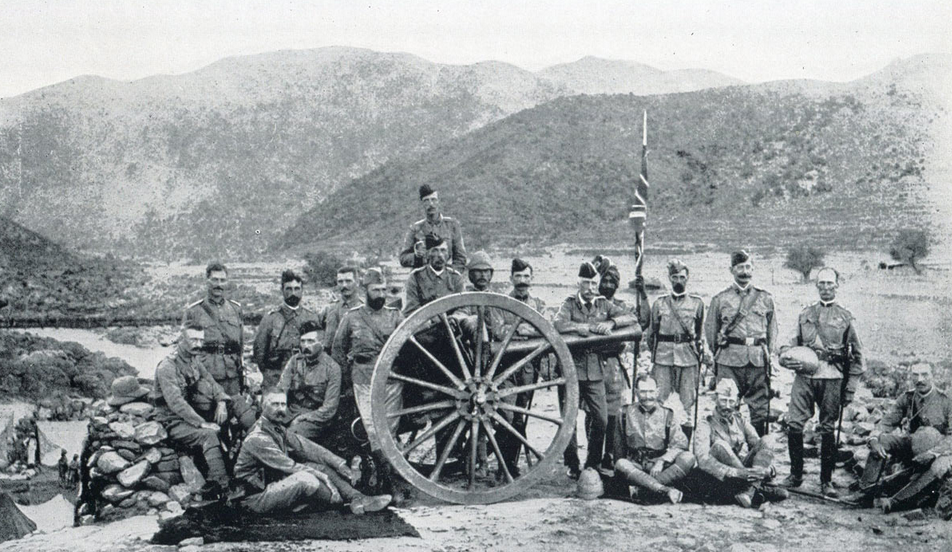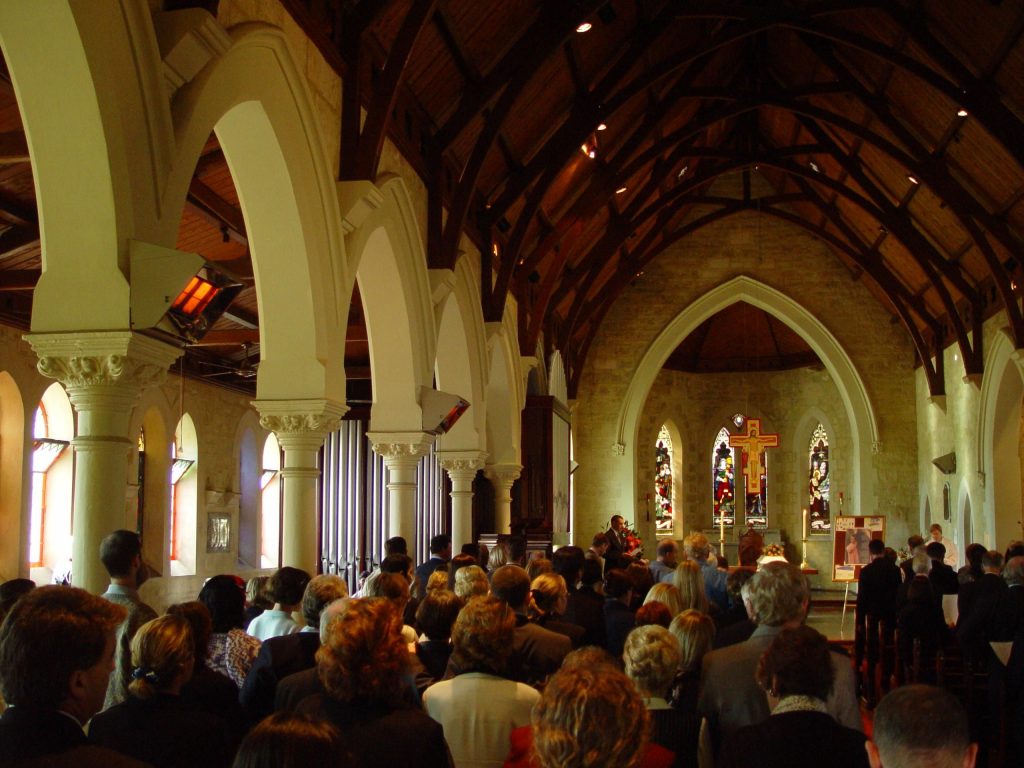Editor’s note: Here follows the fourteenth chapter of The Story of the Malakand Field Force: An Episode of Frontier War, by Winston S. Churchill (published 1898). All spelling in the original.
CHAPTER XIV: BACK TO THE MAMUND VALLEY
"Again I revisit the hills where we sported,
The streams where we swam, and the fields where we fought."
"On a Distant View of Harrow," BYRON.
It is with a vague and undefined feeling of satisfaction that I conduct the reader back to the entrenched camp of Inayat Kila at the entrance of the Mamund Valley, where so much happened, and with which so many memories and experiences are associated. Now that the troops are gone, the scene of life and activity has become solitary and silent. The graves of the officers and men who fell there are lost in the level of the plain. Yet the name is still remembered in not a few English homes, nor will the tribesmen, looking at the deserted entrenchment, easily forget the visit of the 2nd Brigade.
When, on the afternoon of the 15th, the camp had first been pitched, only a small and hasty shelter-trench surrounded it. But as the weeks passed, the parapets grew higher, the ditches deeper, and the pits more numerous, until the whole place became a redoubt. Traverses were built along the perimeter to protect the defenders from flanking fire. Great walls of earth and stone sheltered the horses and mules. Fifty yards out, round the whole camp, a wire trip was carefully laid, to break a rush, and the paths and tracks leading to the entrances had become beaten, level roads. The aspect of permanency was comforting.
Since the action of the 16th September, the 2nd Brigade had been unable to move. Transport—the life and soul of an army—is an even more vital factor here than in less undeveloped countries. The mobility of a brigade depends entirely on its pack animals. On the 14th many mules were killed. On the 16th the field hospitals were filled with wounded. It now became impossible for the camp to move, because the wounded could not be carried. It was impossible to leave them behind, because, deducting an adequate guard, the rest of the brigade would have been too few for fighting. The 2nd Brigade was therefore a fixture. Its striking power was limited to out and home marches. The first step taken by Sir Bindon Blood was to restore its mobility by getting the wounded sent down to the base. Some changes in the constitution of the force were also made. The 11th Bengal Lancers, who now joined the Mohmand Field Force, were succeeded by the Guides Cavalry. The 35th Sikhs, who had suffered such severe losses, were replaced by the 31st Punjaub Infantry from Panjkora. The Buffs, who were full of fever, were exchanged for the Royal West Kent from the Malakand. No.7 British Mountain Battery took the place of No.8, which was now reduced to four guns, having lost in the week’s fighting half its officers, a third of its mules, and a quarter of its men.
Camels to carry the wounded were sent up from Panjkora. The Buffs escorted the long convoy down the line of communications. Every one in camp was sorry to see the last of them. In the fighting of the week they had made it clear that the British Infantry battalion is the backbone of every mixed brigade, and they shared with the Guides Infantry one of those enviable reputations for steadiness which are so hard to gain and so easy to lose on active service.
On the 24th of September Sir Bindon Blood received despatches appointing him to the command of the First Division of the Tirah Expeditionary Force, and as the negotiations with the Mamund Jirgahs were then in progress, and it seemed that a settlement might be reached, he proceeded with his staff to Panjkora. Here he was on the telegraph wire, and could communicate easily and quickly with India, and at the same time watch the progress of events at Inayat Kila. Mr. Davis conducted the diplomatic relations with the Mamunds. On the 26th a Jirgah from the tribe came into camp. They deposited 4000 rupees as a token of submission, and brought in fifty firearms. These, however, were of the oldest and most antiquated types, and were obviously not the weapons with which so many soldiers had been killed and wounded. This was pointed out to the tribal representatives. They protested that they had no others. They were poor men, they said, and their property was at the mercy of the Government. But they had no other arms.
The political officer was firm, and his terms were explicit. Either they must give up the twenty-two rifles captured from the 35th Sikhs, on the 16th, or their villages would be destroyed. No other terms would he accept. To this they replied, that they had not got the rifles. They had all been taken, they said, and I think with truth, by the Afghan tribesmen from the Kunar Valley. These would not give them up. Besides—this also with truth—they had been taken in “fair war.”
One man, who had lived some years in Calcutta, was especially eloquent on the subject, and argued the case with much skill. He was however, crushed by Mr. Davies asking whether there were “no greybeards in the tribe,” and why they were “led by a babu” [a native clerk—the Oriental embodiment of Red Tape]. The discussion was extended to the whole question of their quarrel with the British power. They admitted having sent their young men to attack the Malakand and Chakdara. “All the world was going ghaza,” they said. They could not stay behind. They also owned to having gone five miles from their valley to attack the camp at Markhanai. Why had the Sirkar burnt their village? they asked. They had only tried to get even—for the sake of their honour. All this showed a most unsatisfactory spirit from the Government point of view, and it was evident that the brigade could not leave the valley until the tribesmen adopted a more submissive attitude. The matter reverted to the crucial point. Would they give up their rifles or not? To this they replied evasively, that they would consult their fellow-tribesmen and return an answer on the next day. This practically amounted to a refusal, and as no reply was received on the 27th, the negotiations ceased.
In consequence of this and of the threatening attitude of the tribesmen throughout Dir and Bajaur, Sir Bindon Blood telegraphed to the Government of India and recommended the retention of a large force in these territories. By so doing he virtually resigned the command which awaited him in the Tirah expedition. This disinterested decision caused the liveliest satisfaction throughout the force. The Government accepted the advice of their general. The Tirah force was reconstituted, and Major-General W.P. Symons received the command of its first division. A force of eleven battalions, seven squadrons and three batteries was placed at Sir Bindon Blood’s disposal, and he was directed to deal with the local situation as he should see fit. He immediately ordered General Jeffreys to resume the punitive operations against the Mamunds.
In pursuance of these orders, the 2nd Brigade, on the 29th, destroyed all the villages in the centre of the valley, some twelve or fourteen in number, and blew up with dynamite upwards of thirty towers and forts. The whole valley was filled with the smoke, which curled upwards in dense and numerous columns, and hung like a cloud over the scene of destruction. The continued explosions of the demolitions resembled a bombardment. The tribesmen, unable to contend with the troops in the open, remained sullenly on the hillsides, and contented themselves with firing from long range at the cavalry patrols.

I feel that this is a fitting moment to discuss the questions which village-burning raises. I have described with independent impartiality the progress of the quarrel between the British and the tribesmen. In a similar spirit I approach the examination of the methods of offence employed. Many misconceptions, some of which are caused by an extraordinary ignorance, exist on this subject in England. One member of the House of Commons asked the Secretary of State whether, in the punishment of villages, care was taken that only the houses of the guilty parties should be destroyed. He was gravely told that great care was taken. The spectacle of troops, who have perhaps carried a village with the bayonet and are holding it against a vigorous counter-attack, when every moment means loss of life and increase of danger, going round and carefully discriminating which houses are occupied by “guilty parties,” and which by unoffending people, is sufficiently ridiculous. Another member asked, “Whether the villages were destroyed or only the fortifications.” “Only the fortifications,” replied the minister guilelessly. What is the actual fact? All along the Afghan border every man’s house is his castle. The villages are the fortifications, the fortifications are the villages. Every house is loopholed, and whether it has a tower or not depends only on its owner’s wealth. A third legislator, in the columns of his amusing weekly journal, discussed the question at some length, and commented on the barbarity of such tactics. They were not only barbarous, he affirmed, but senseless. Where did the inhabitants of the villages go? To the enemy of course! This reveals, perhaps, the most remarkable misconception of the actual facts. The writer seemed to imagine that the tribesmen consisted of a regular army, who fought, and a peaceful, law-abiding population, who remained at their business, and perhaps protested against the excessive military expenditure from time to time. Whereas in reality, throughout these regions, every inhabitant is a soldier from the first day he is old enough to hurl a stone, till the last day he has strength to pull a trigger, after which he is probably murdered as an encumbrance to the community.
Equipped with these corrected facts, I invite the reader to examine the question of the legitimacy of village-burning for himself. A camp of a British brigade, moving at the order of the Indian Government and under the acquiescence of the people of the United Kingdom, is attacked at night. Several valuable and expensive officers, soldiers and transport animals are killed and wounded. The assailants retire to the hills. Thither it is impossible to follow them. They cannot be caught. They cannot be punished. Only one remedy remains—their property must be destroyed. [It may be of interest, to consider for a moment the contrast between the effects of village-burning on the Indian Frontier and in Cuba. In Cuba a small section of the population are in revolt; the remainder are sympathisers. To screw these lukewarm partisans up to the fighting-point, the insurgents destroy their villages and burn the sugar-came. This, by placing the alternative of “fight or starve” before the inhabitants, has the effect of driving them to take up arms against the Spaniards, whom they all hate, and join the rebels in the field. Thus in Cuba it is the endeavour of the Government to protect property, and of the rebels to destroy it. It was with the aim of keeping the wavering population loyal, that General Weyler collected them all into the towns, with such painful results. His policy was cruel but sound, and, had it been accompanied by vigorous military operations, might have been successful.] Their villages are made hostages for their good behavior. They are fully aware of this, and when they make an attack on a camp or convoy, they do it because they have considered the cost and think it worth while. Of course, it is cruel and barbarous, as is everything else in war, but it is only an unphilosophic mind that will hold it legitimate to take a man’s life, and illegitimate to destroy his property. The burning of mud hovels cannot at any rate be condemned by nations whose customs of war justify the bombardment of the dwelling-houses of a city like Paris, to induce the garrison to surrender by the sufferings of the non-combatants.
In official parlance the burning of villages is usually expressed euphemistically as “So many villages were visited and punished,” or, again, “The fortifications were demolished.” I do not believe in all this circumlocution. The lack of confidence in the good sense of the British democracy, which the Indian Government displays, is one of its least admirable characteristics. Exeter Hall is not all England; and the people of our islands only require to have the matter put fairly before them to arrive at sound, practical conclusions. If this were not so, we should not occupy our present position in the world.
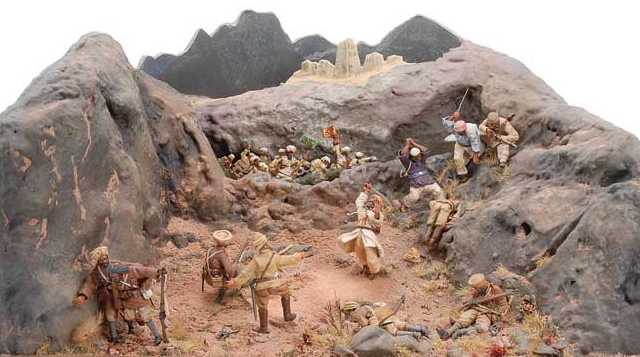
To return to the Mamund Valley. The difference between villages in the plains and those in the hills was forcibly demonstrated. On the 29th over a dozen villages in the plains were destroyed without the loss of a single life. On the 30th the tale ran somewhat differently. The village of Agrah adjoins the village of Zagai, the capture of which has already been recorded. It stood in a broad re-entrant of the mountains, and amid ground so tangled and broken, that to move over it is difficult, and to describe it impossible. On the steep face of the mountain great rocks, sometimes thirty feet high, lay tossed about: interspersed with these were huts or narrow terraces, covered with crops, and rising one above the other by great steps of ten or twelve feet each. The attack on such a place was further complicated by the fact that the same re-entrant contained another village called Gat, which had to be occupied at the same time. This compelled the brigade to attack on a broader front than their numbers allowed. It was evident, as the Guides Cavalry approached the hills, that resistance was contemplated. Several red standards were visible to the naked eye, and the field-glasses disclosed numerous figures lining the ridges and spurs. The squadrons, advancing as far as the scrub would allow them, soon drew the fire of isolated skirmishers. Several troops dismounted, and returned the salute with their carbines, and at 8.45 a dropping fire began. The brigade now came into action in the following formation. The cavalry, on the extreme left, covered the head of a considerable valley, from which the flank was threatened; the Guides Infantry and the Royal West Kent Regiment prolonged the line to the centre of the attack; the 31st Punjaub Infantry moved against the spurs to the right of the village, and the 38th Dogras were in reserve. The action was begun by the Guides Infantry storming the ridges to the left of the enemy’s position. These were strongly held and fortified by sungars, behind which the defenders were sheltered. The Guides advanced at a brisk pace, and without much firing, across the open ground to the foot of the hills. The tribesmen, shooting from excellent cover, maintained a hot fire. The bullets kicked up the dust in all directions, or whistled viciously through the air; but the distance was short, and it was soon apparent that the enemy did not mean to abide the assault. When the troops got within 100 yards and fixed bayonets, a dozen determined men were still firing from the sungars. The Afridi and Pathan companies of the Guides, uttering shrill cries of exultation, culminating in an extraordinary yell, dashed forward, climbed the hill as only hillmen can climb, and cleared the crest. On the side of the next hill the figures of the retreating tribesmen were visible, and many were shot down before they could find shelter.
It was a strange thing, to watch these conspicuous forms toiling up the hillside, dodging this way and that way, as the bullets cut into the earth around them; but with the experience of the previous ten minutes fresh in the memory, pity was not one of the emotions it aroused. A good many fell, subsiding peacefully, and lying quite still. Their fall was greeted by strange little yells of pleasure from the native soldiers. These Afridi and Pathan companies of the Guides Infantry suggest nothing so much as a well-trained pack of hounds. Their cries, their movements, and their natures are similar.
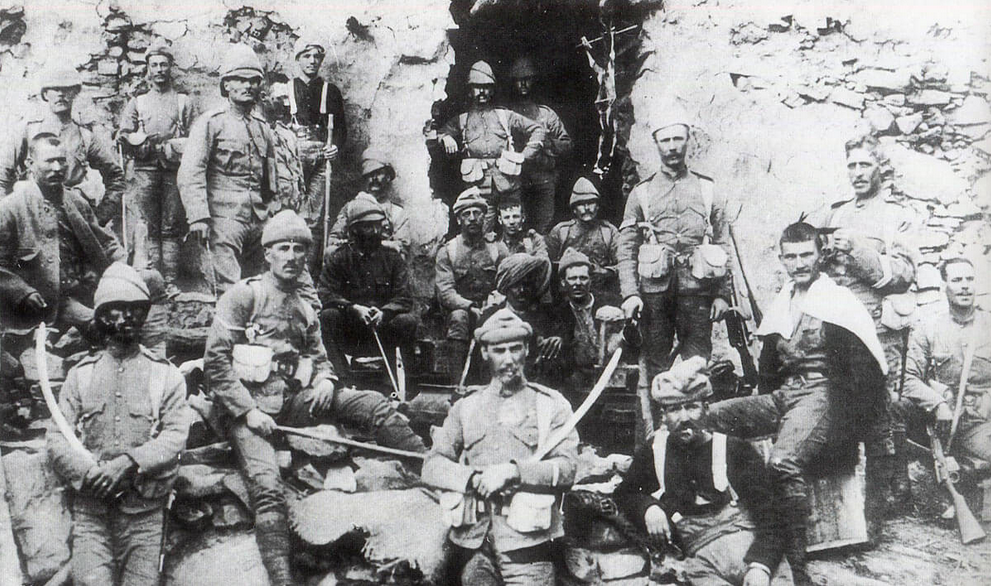
The West Kents had now come into line on the Guides’ right, and while the latter held the long ridge they had taken, the British regiment moved upon the village. Here the resistance became very severe. The tangled and broken ground, rising in terraces, sometimes ten feet high, and covered with high crops, led to fighting at close quarters with loss on both sides. Loud and continuous grew the musketry fire. The 31st Punjaub Infantry, who had ascended the spur on the right, soon joined hands with the West Kents, and both regiments became hotly engaged. Meantime the Mountain Battery, which had come into action near the centre, began to throw its shells over the heads of the infantry on to the higher slopes, from which the enemy were firing. It soon became evident that the troops were too few for the work. On the left the Guides Infantry were unable to leave the ridge they had captured, lest it should be reoccupied by the enemy, who were showing in great strength. A gap opened in consequence, between the Guides and Royal West Kents, and this enabled the tribesmen to get round the left flank of the British regiment, while the 31st Punjaub Infantry, on the right, were also turned by the enveloping enemy. It is to these circumstances that most of the losses were due.
The British regiment forced its way through the village, and encountered the enemy strongly posted in sungars among the rocks above it. Here they were sharply checked. The leading company had stormed one of these fortifications, and the enemy at once retired higher up the hill. About fifteen men were inside the work, and perhaps thirty more just below it. The whole place was commanded by the higher ground. The enemy’s fire was accurate and intense.
Of those inside, four or five were instantly killed or wounded. The sungar was a regular trap, and the company were ordered to retire. Lieutenant Browne-Clayton remained till the last, to watch the withdrawal, and in so doing was shot dead, the bullet severing the blood-vessels near the heart. The two or three men who remained were handing down his body over the rock wall, when they were charged by about thirty Ghazis and driven down the hill. A hundred and fifty yards away, Major Western had three companies of the West Kents in support. He immediately ordered Captain Styles to retake the sungar, and recover the body. The company charged. Captain Styles was the first to reach the stone wall, and with Lieutenant Jackson cleared it of such of the enemy as remained. Five or six men were wounded in the charge, and others fell in the sungar. The advanced position of this company was soon seen to be untenable, and they were ordered to fall back to the edge of the village, where the whole regiment was hotly engaged.
Meanwhile the 31st Punjaub Infantry, who had advanced under Colonel O’Bryen on the right, were exposed to a severe fire from a rocky ridge on their flank. Their attack was directed against a great mass of boulders, some of them of enormous size, which were tenaciously held by the enemy. The fighting soon became close. The two advanced companies were engaged at a distance of under 100 yards. Besides this the cross fire from their right flank added to their difficulties. In such a position the presence of Colonel O’Bryen was invaluable. Moving swiftly from point to point, he directed the fire and animated the spirit of the men, who were devoted to him. It was not long before the enemy’s marksmen began to take aim at this prominent figure. But for a considerable period, although bullets struck the ground everywhere around him, he remained unhurt. At last, however, he was shot through the body, and carried mortally wounded from the action.
I pause to consider for a moment the conditions, and circumstances, by which the pursuit of a military career differs from all others. In political life, in art, in engineering, the man with talents who behaves with wisdom may steadily improve his position in the world. If he makes no mistakes he will probably achieve success. But the soldier is more dependent upon external influences. The only way he can hope to rise above the others, is by risking his life in frequent campaigns. All his fortunes, whatever they may be, all his position and weight in the world, all his accumulated capital, as it were, must be staked afresh each time he goes into action. He may have seen twenty engagements, and be covered with decorations and medals. He may be marked as a rising soldier. And yet each time he comes under fire his chances of being killed are as great as, and perhaps greater than, those of the youngest subaltern, whose luck is fresh. The statesman, who has put his power to the test, and made a great miscalculation, may yet retrieve his fortunes. But the indiscriminating bullet settles everything. As the poet somewhat grimly has it:—
Stone-dead hath no better.
Colonel O’Bryen had been specially selected, while still a young man, for the command of a battalion. He had made several campaigns. Already he had passed through the drudgery of the lower ranks of the service, and all the bigger prizes of the military profession appeared in view: and though the death in action of a colonel at the head of his regiment is as fine an end as a soldier can desire, it is mournful to record the abrupt termination of an honourable career at a point when it might have been of much value to the State.

The pressure now became so strong along the whole line that the brigadier, fearing that the troops might get seriously involved, ordered the withdrawal to commence. The village was however burning, and the enemy, who had also suffered severely from the close fighting, did not follow up with their usual vigour. The battery advanced to within 600 yards of the enemy’s line, and opened a rapid fire of shrapnel to clear those spurs that commanded the line of retirement. The shells screamed over the heads of the West Kent Regiment, who were now clear of the hills and in front of the guns, and burst in little white puffs of smoke along the crest of the ridge, tearing up the ground into a thick cloud of dust by the hundreds of bullets they contained.
A continuous stream of doolies and stretchers commenced to flow from the fighting line. Soon all available conveyances were exhausted, and the bodies of the wounded had to be carried over the rough ground in the arms of their comrades—a very painful process, which extorted many a groan from the suffering men. At length the withdrawal was completed, and the brigade returned to camp. The presence of the cavalry, who covered the rear, deterred the enemy from leaving the hills.
Riding back, I observed a gruesome sight. At the head of the column of doolies and stretchers were the bodies of the killed, each tied with cords upon a mule. Their heads dangled on one side and their legs on the other. The long black hair of the Sikhs, which streamed down to the ground, and was draggled with dust and blood, imparted a hideous aspect to these figures. There was no other way, however, and it was better than leaving their remains to be insulted and defiled by the savages with whom we were fighting. At the entrance to the camp a large group of surgeons—their sleeves rolled up—awaited the wounded. Two operating tables, made of medical boxes, and covered with water-proof sheets, were also prepared. There is a side to warfare browner than khaki.
The casualties in the attack upon Agrah were as follows:—
BRITISH OFFICERS.
Killed—Lieut.-Col. J.L. O'Bryen, 31st Punjaub Infantry.
" 2nd Lieut. W.C. Brown-Clayton, Royal West Kent.
Wounded severely—Lieutenant H. Isacke, Royal West Kent.
" " " E.B. Peacock, 31st Punjaub Infantry.
Wounded slightly—Major W.G.B. Western, Royal West Kent.
" " Captain R.C. Styles, Royal West Kent.
" " " N.H.S. Lowe, Royal West Kent.
" " 2nd Lieut. F.A. Jackson, Royal West Kent.
BRITISH SOLDIERS.
Killed. Wounded.
Royal West Kent... 3 20
NATIVE RANKS.
Killed. Wounded.
Guides Cavalry... 0 4
31st Punjaub Infantry . 7 15
38th Dogras ... 0 4
Total casualties, 61.
As soon as Sir Bindon Blood, at his camp on the Panjkora, received the news of the sharp fighting of the 30th, [After the action of the 30th of September, Lieut.-Colonel McRae, of the 45th Sikhs, was sent up to command the 31st Punjaub Infantry in the place of Lieut.-Colonel O’Bryen, and I was myself attached as a temporary measure to fill another of the vacancies. This is, I believe, the first time a British Cavalry officer has been attached to a native infantry regiment. After the kindness and courtesy with which I was treated, I can only hope it will not be the last.] he decided to proceed himself to Inayat Kila with reinforcements. He arrived on the 2nd October, bringing No.8 Mountain Battery; a wing of the 24th Punjaub Infantry; and two troops of the Guides Cavalry; and having also sent orders for the Highland Light Infantry and four guns of the 10th Field Battery to follow him at once. He was determined to make a fresh attack on Agrah, and burn the village of Gat, which had only been partially destroyed. And this attack was fixed for the 5th. By that date the big 12-pounder guns of the Field Battery were to have arrived, and the fire of fourteen pieces would have been concentrated on the enemy’s position. Every one was anxious to carry matters to a conclusion with the tribesmen at all costs.
On the 3rd, the force was ordered to take and burn the village of Badelai, against which, it may be remembered, the Buffs had advanced on the 16th, and from which they had been recalled in a hurry to support the 35th Sikhs. The attack and destruction of the village presented no new features; the tribesmen offered little resistance, and retired before the troops. But as soon as the brigade began its homeward march, they appeared in much larger numbers than had hitherto been seen. As the cavalry could not work among the nullahs and the broken ground, the enemy advanced boldly into the plain. In a great crescent, nearly four miles long, they followed the retiring troops. A brisk skirmish began at about 800 yards. Both batteries came into action, each firing about 90 shells. The Royal West Kent Regiment made good shooting with their Lee-Metford rifles. All the battalions of the brigade were engaged. The enemy, whose strength was estimated to be over 3000, lost heavily, and drew off at 2.30, when the force returned to camp. Sir Bindon Blood and his staff watched the operations and reconnoitered the valley. The casualties were as follows:—
Royal West Kent—dangerously wounded, 1.
Guides Cavalry—wounded, 2.
31st Punjaub Infantry—killed, 1; wounded, 5.
Guides Infantry—wounded, 3.
38th Dogras—killed, 1; wounded, 3.
Total casualties, 16.
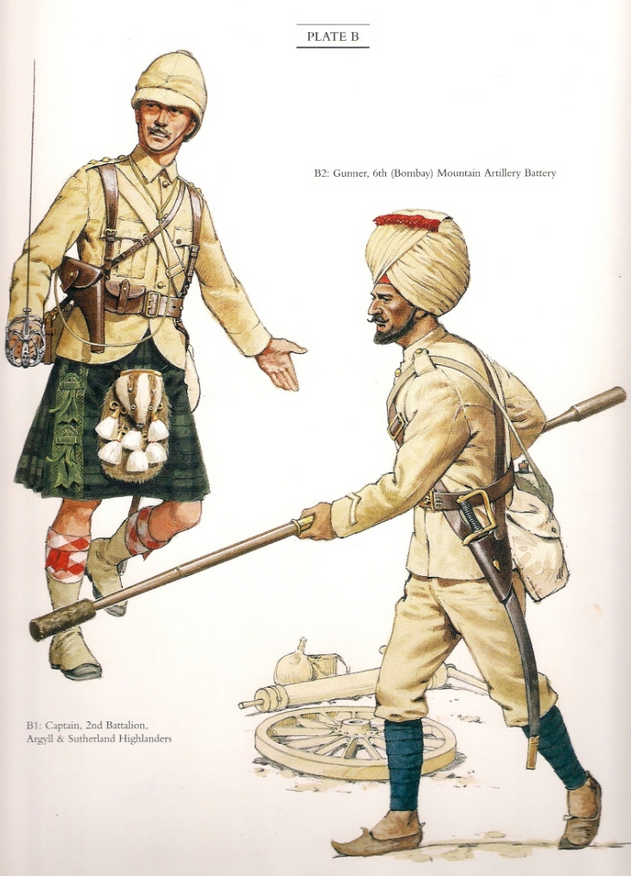
The next day the Highland Light Infantry and the field guns arrived. The former marched in over 700 strong, and made a fine appearance. They were nearly equal in numbers to any two battalions in the brigade. Sickness and war soon reduce the fighting strength. The guns had accomplished a great feat in getting over the difficult and roadless country. They had had to make their own track, and in many places the guns had been drawn by hand. The 10th Field Battery had thus gone sixty miles further into the hill country than any other wheeled traffic. They had quite a reception when they arrived. The whole camp turned out to look with satisfaction on the long polished tubes, which could throw twelve pounds a thousand yards further than the mountain guns could throw seven. They were, however, not destined to display their power. The Mamunds had again sued for peace. They were weary of the struggle. Their valley was desolate. The season of sowing the autumn crops approached. The arrival of reinforcements convinced them that the Government were determined to get their terms. Major Deane came up himself to conduct the negotiations. Meanwhile all important operations were suspended, though the foraging and “sniping” continued as usual.
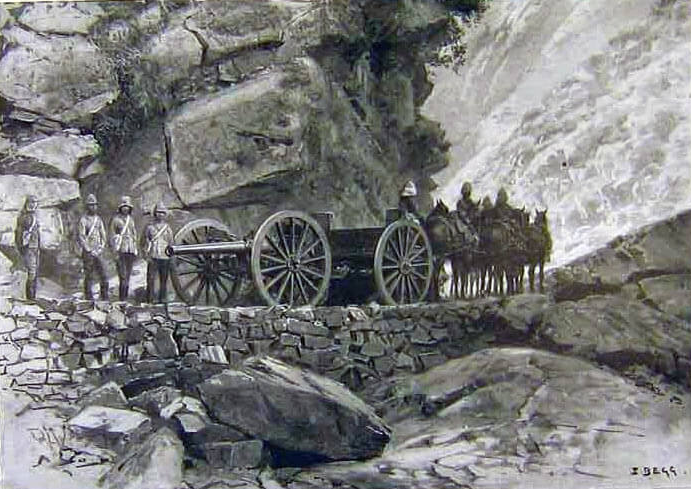
The force was now large enough for two brigades to be formed, and on the arrival of Brigadier-General Meiklejohn it was reconstituted as follows:—
1st Brigade.
Commanding—Brigadier-General Meiklejohn, C.B., C.M.G.
Highland Light Infantry.
31st Punjaub Infantry.
4 Cos. 24th Punjaub Infantry.
10th Field Battery.
No.7 British Mountain Battery.
2nd Brigade.
Commanding—Brigadier-General Jeffries, C.B.
The Royal West Kent.
38th Dogras.
Guides Infantry.
No.8 Mountain Battery.
The Guides Cavalry.
The camp was greatly extended and covered a large area of ground. In the evenings, the main street presented an animated appearance. Before the sun went down, the officers of the different regiments, distinguished by their brightly-coloured field caps, would assemble to listen to the pipes of the Scottish Infantry, or stroll up and down discussing the events of the day and speculating on the chances of the morrow. As the clear atmosphere of the valley became darkened by the shadows of the night, and the colours of the hills faded into an uniform black, the groups would gather round the various mess tents, and with vermuth, cigarettes and conversation pass away the pleasant half-hour before dinner and “sniping” began.
I would that it were in my power to convey to the reader, who has not had the fortune to live with troops on service, some just appreciation of the compensations of war. The healthy, open-air life, the vivid incidents, the excitement, not only of realisation, but of anticipation, the generous and cheery friendships, the chances of distinction which are open to all, invest life with keener interests and rarer pleasures. The uncertainty and importance of the present, reduce the past and future to comparative insignificance, and clear the mind of minor worries. And when all is over, memories remain, which few men do not hold precious. As to the hardships, these though severe may be endured. Ascetics and recluses have in their endeavours to look beyond the grave suffered worse things. Nor will the soldier in the pursuit of fame and the enjoyment of the pleasures of war, be exposed to greater discomforts than Diogenes in his tub, or the Trappists in their monastery. Besides all this, his chances of learning about the next world are infinitely greater. And yet, when all has been said, we are confronted with a mournful but stubborn fact. In this contrary life, so prosaic is the mind of man, so material his soul, so poor his spirit, that there is no one who has been six months on active duty who is not delighted to get safe home again, to the comfortable monotonies of peace.

